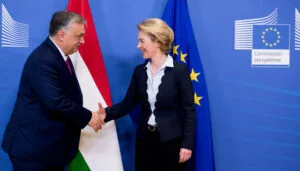Brussels – Just as Viktor Orbán landed in Brussels to participate in the three-day EU-Western Balkans summit and the highly sensitive European Council (held in stalemate by the Hungarian premier himself), the green light from the EU Commission has arrived. Hungary’s judicial reforms have been positively assessed, allowing the release of 10.2 billion euros in cohesion policy, maritime and fisheries, and home affairs funds. “We have received sufficient assurances that the independence of the judiciary will be strengthened in Hungary; however, today’s decision is not the end of the process,” disclosed Justice Commissioner Didier Reynders.

The decision had been expected for weeks, partly due to a question of technical timing related to another dossier, which instead received a negative opinion (and again without surprises): the €6.3 billion blocked by the rule of law conditionality mechanism. “After an in-depth assessment and several exchanges with the Hungarian government, the commission considers that Hungary has taken the steps it committed to take” regarding the horizontal enabling conditions,” – that is, the links between disbursement of funds and violation of the EU Charter of Fundamental Rights – is what is stated in the note
of the Berlaymont arrived late this afternoon (Dec. 13). The issue was that of judicial independence, which would be resolved by four measures adopted by Budapest: increased powers of the independent National Judicial Council “to limit undue influence and discretionary decisions and to ensure more objective and transparent administration of the courts”, reform of the functioning of the Supreme Court “to limit the risks of political influence”, elimination of the Constitutional Court’s role in reviewing final decisions of judges at the request of public authorities, and the Supreme Court’s ability to review issues that judges wish to refer to the EU Court of Justice.
In practical terms, this means that “a portion of the cohesion policy funding will no longer be blocked,” and Hungary will be able to start claiming repayments “up to about 10.2 billion euros.” The commission promises to monitor through “audits, active engagement with stakeholders and monitoring committees” the implementation of Hungary’s measures, and “at any time” funding can be blocked again if horizontal enabling conditions are violated. Three other areas covered by the horizontal enabling conditions, however, remain frozen, for which judicial independence was not the only obstacle: “Concerns relate to the so-called Hungarian Child Protection Act, serious risks to academic freedom, and the right to asylum,” the Commission points out.

From left: European Council President Charles Michel and Hungary’s Prime Minister Viktor Orbán in Budapest (Nov. 27, 2023)
As the von der Leyen cabinet always specifies (although it should still be noted a lack of transparency on the specific funds blocked or unfrozen), the funding now stalled for Hungary “amounts to about 21 billion euros.” And here two other issues must be considered: the rule of law conditionality mechanism and the National Recovery and Resilience Plan. On the first stumbling block, “the commission considers that the country has not addressed the violations of the rule of law principles that led to the adoption of the measures,”
decided by the council in December 2022 and for this reason, the von der Leyen cabinet “is not in a position to propose the adjustment or lifting of the measures against Hungary.” The second issue concerns Hungary’s Pnrr 5.8 billion constrained by 27 super-objectives: “As the super-objectives have not been fully complied with, no payment request can be disbursed for the time being,” the EU executive reports, pointing out that 4 out of 27 relate to judicial independence and 21 out of 27 correspond to corrective measures of the conditionality mechanism. The total amount of the Hungarian Pnrr has risen to 10.4 billion with the clearance of the RePowerEu chapter
of €4.6 billion, with its €900 million automatic and unrestricted pre-financing).
EU frozen funds to Hungary
According to the
more accurate data provided last May by the commission services themselves, the EU funds for Hungary frozen by Brussels stood at 28.6 billion euros, divided into three macro-areas: National Recovery and Resilience Plan (5.8 billion), Cohesion Policy Funds (22.6 billion) and Home Affairs Funds (223 million). The three paths proceed in parallel, each with a specific procedure (or several, depending on the nature of the funding). The first considers the “27 super-objectives” on the rule of law
set on November 30 last year by the Commission to release Hungary’s NDP funds i.e., 5.8 billion in grants. What is expected from Budapest is that judicial independence will be strengthened, so that judges’ decisions will be “protected from outside political interference.”
 The second chapter – definitely the most complex – is the one concerning the cohesion policy funds, which for Hungary are worth a total of 22.6 billion euros as funding from the EU budget. Of these funds, 6.3 billion were frozen through the rule of law conditionality mechanism by the council decision
The second chapter – definitely the most complex – is the one concerning the cohesion policy funds, which for Hungary are worth a total of 22.6 billion euros as funding from the EU budget. Of these funds, 6.3 billion were frozen through the rule of law conditionality mechanism by the council decision
in December 2022 (and which remain frozen). This is a separate procedure involving 55 percent of the funds allocated to Hungary from three operational programs financed by the European Regional Development Fund (ERDF), the Cohesion Fund, the Just Transition Fund (JTF), and the European Social Fund Plus (ESF+): “Environment and Energy Efficiency Plus”, “Integrated Transport Plus”, and “Spatial and Settlement Development Plus”.
Of the remaining 16.3 billion, 12.9 billion were tied only to the implementation of judicial reforms (without additional criteria) and these are the ones that were partly unblocked by Brussels after the review request. The remaining 3.4 billion are blocked for non-compliance with horizontal enabling conditions – that is, the necessary conditions as far as the EU Charter of Fundamental Rights is concerned – in three disputes between the Commission and Hungary: the “child protection” law (the
anti-Lgbtq+ law), the one on academic independence, and the one on treatment of asylum seekers. The first issue is responsible for stalling 3 percent of the cohesion policy budget (i.e., 678 million), the second by 9 percent (over 2 billion), and the third by an additional 3 percent (another 678 million). To unlock these funds it is not enough to put an end to the issues related to the independence of the judiciary (although it remains a pre-requisite for all of these) since the pending issues regarding the other horizontal enabling conditions must also be resolved.

The Prime Minister of Hungary Viktor Orbán
Finally, there is the last issue to consider, that of the 223.1 million euros from three Home Affairs Funds programs. As learned by Eunews in February from sources inside the EU executive – and then confirmed again in mid-November –it is 69.8 million from the Asylum, Migration and Integration Fund (AMIF), 102.8 from the Border Management and Visa Instrument (BMVI), and 50.5 from the Internal Security Fund (ISF). However, given the commission’s lack of transparency, it is difficult at the moment to understand what exactly of these funds has been released. However, according to what can be read in the implementation decisions, only the IISF and BMVI funds are exclusively related to justice issues, while the AMIF funds are also related to asylum, non-refoulement, and returns: this would result in a release of 153.3 million out of 223.1.
English version by the Translation Service of Withub





